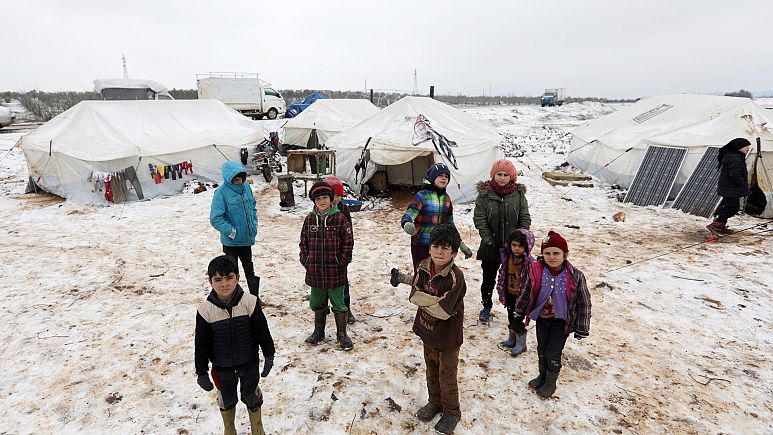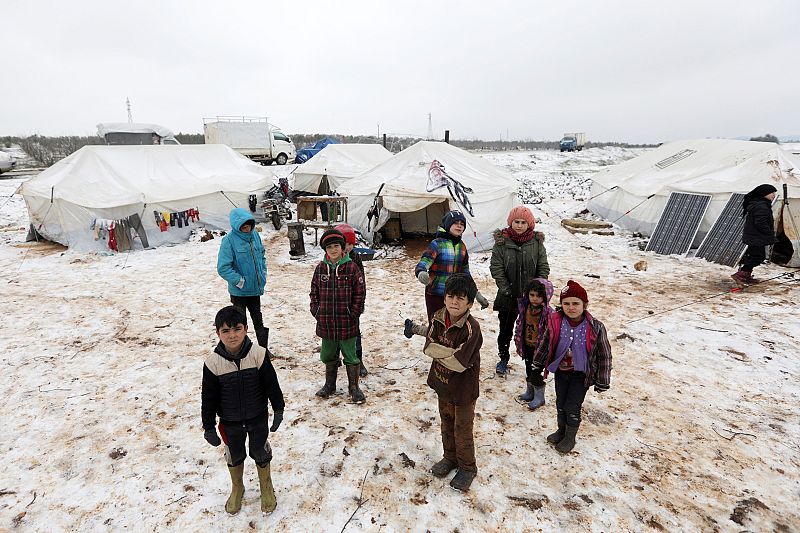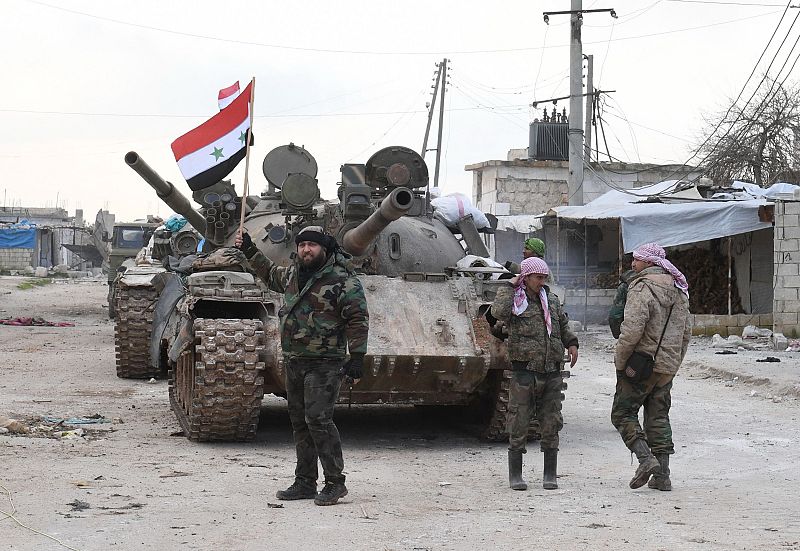Turkey-Syria clashes escalate as humanitarian crisis grows

LONDON — Turkish and Russian-backed Syrian forces have clashed in recent days in Syria's last rebel stronghold, threatening to escalate hostilities in a region where as many as 800,000 civilians have been displaced.
President Bashar al-Assad's forces have battled Turkish-backed fighters in the northwestern province of Idlib for years, but Damascus and Ankara in recent days have taken to directly targeting each other's troops. Turkey said it had retaliated on Monday after Syrian forces killed five of its soldiers in Idlib, a week after a similarly deadly clash between the two sides.
"Escalation is likely going to continue as long as Turkey and Russia cannot agree on a new cease-fire," said Berkay Mandıracı, a Turkey analyst at the International Crisis Group.

Despite continued talks between Russia and Turkey no new cease-fire or de-escalation agreement has been reached between the two sides. Instead, President Recep Tayyip Erdogan threatened Wednesday to escalate the conflict beyond Idlib's borders if another Turkish soldier was hurt.
"We will hit the regime forces anywhere without limiting ourselves to Idlib and to the boundaries of the Sochi memorandum," he told members of his AK Party, referring to cease-fire lines agreed between Russia and Turkey in 2018 that created a buffer or de-escalation zone in Idlib."We will not wait for the outcome of those endless meetings."
Erdogan accused Russia and Assad's forces of directly targeting civilians in Idlib province — an accusation that Moscow swiftly denied while accusing terrorist groups of hiding behind a "human shield." The Syrian government has consistently denied targeting civilians throughout the conflict.
In a statement Wednesday, the Russian defense ministry blamed Turkey for "the crisis" in the Idlib de-escalation zone, accusing Ankara of failing to separate moderate opposition fighters from "terrorists." Syrian fighters sponsored and trained by Turkey include rebel fighters and Islamic extremists opposed to Assad, according to the Associated Press.
However, Ankara seemed to tone down its more bellicose rhetoric Thursday when Defense Minister Hulusi Akar said Turkey was sending additional troops to "enable a permanent cease-fire."
"Force will be used against those who do not comply with the cease-fire," he added.
The humanitarian cost
Meanwhile, civilians are being caught in the fighting.
"Since the beginning of the year, over 200 people have been killed as a result of the violence — including at least 84 children," Misty Buswell, regional policy director for the IRC said in a statement.
And every day of violence causes more civilians to flee.
"In the last 24 hours, 20,000 people in Idlib packed their bags and fled to escape bombing," the United Nations Under-Secretary-General for humanitarian affairs and emergency relief coordinator, Mark Lowcok, wrote in an article for Britain's Daily Telegraphon Tuesday.
Most of them, he said, were women and children.
Since Dec. 1, nearly 800,000 people have been forcibly displaced in Idlib, an area roughly the size of Delaware, according to the United Nations. The IRC estimates that another 500,000 people remain in the firing line and will be displaced if violence continues.
And if the violence doesn't kill them, now the weather might.
Those on the move have been battling bitter temperatures that have dropped as low as —11 degrees Celsius ( 12 degrees Fahrenheit) in Idlib this week, with thousands sheltering in tents, unfinished buildings and their vehicles, according to the IRC.
The U.N. said several children are reported to have died due to the freezing temperatures.
What do both sides hope to achieve?
Despite the dire humanitarian situation, there is no immediate sign of the violence abating as Assad, with Russia's help, battles to take back control of all Syrian territory.
The momentum in Syria is in Assad's favor as Russian-backed government forces have regained most of the country — securingMoscow's place as the kingmaker in the region.
Ankara and Moscow back opposing sides in the Syrian conflict but they have collaborated on finding a political solution to the war.
In the past, Russia has acted as a deal broker and de-conflicting actor for Turkey but this time it has been "conspicuously absent," said Soner Cagaptay, a senior fellow at the Washington Institute for Near East Policy and author of "Erdogan's Empire: Turkey and the Politics of the Middle East."
"What the Russians are doing is trying to let the Assad regime take as much of Idlib as possible before they come in as the firefighters," he said.

Meanwhile, Erdogan's primary objective in Idlib is to ensure that there is not another large flow of Syrian refugees across the border into Turkey, analysts said.
Turkey is already struggling to cope with the some 3.7 million Syrians it currently hosts. And with its economy still fragile following the 2018 currency crisis it has become less welcoming of the new arrivals, many of whom compete with Turks for low-paid work, according to Fadi Hakura, a consulting fellow at Chatham House, an international affairs think tank in London.
Moreover, Erdogan has other goals in sight.
He has endeavored to promote regime change in Damascus since the start of the Syrian conflict and wants to sustain pressure on Assad, Hakura said, as well as securing Turkey's place at the negotiating table over the future of Syria.
"Erdogan has invested a vast amount of political capital and money in Syria from the beginning of the quagmire," said Hakura. "His return is diminishing more with time," he said, adding that it had even "backfired" as Turkey was now hosting millions of refugees.
"It's a bit like when you're gambling and you're losing you still want to continue in the hope that you can recoup your losses," he added.
Saphora Smith reported from London and Aziz Akyavas from Istanbul.